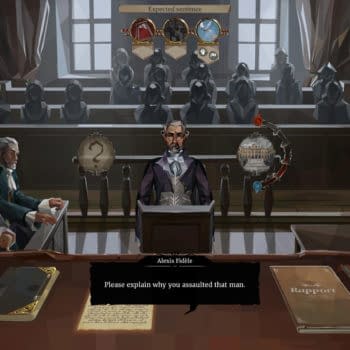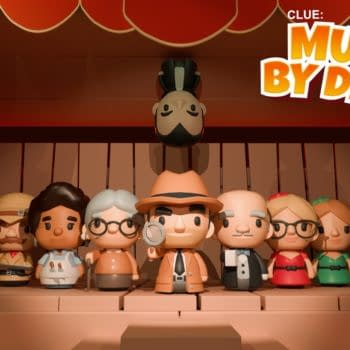Posted in: Games, Video Games | Tagged: epic games, Improbable, Improbable Solutions, SpatialOS, unity, Unreal Engine
Improbable and Epic Games Team Up Against Unity
Improbable Worlds Limited is an English development company which has created a game platform called SpatialOS, which is a cloud based, multi-platform game hosting tool designed to replace the traditional server setup. SpatialOS was initially designed to use Unity (though some of the games in development using Improbable's SDK platform do use other engines), however, developers at Unity have found Improbable and SpatialOS in breach of their terms of service.
The problem came earlier this week when Unity made a change to their terms of service, which effectively makes it a breach of contract to operate or create SpatialOS games using unity.
Improbable released a statement, which implies the terms of service changes are a failure within Unity:
Overnight, this is an action by Unity that has immediately done harm to projects across the industry, including those of extremely vulnerable or small scale developers and damaged major projects in development over many years. Games that have been funded based on the promise of SpatialOS to deliver next-generation multiplayer are now endangered due to their choice of game engine. Live games are now in legal limbo.
All customers who entered into a relationship with us and Unity previously did so on the good faith understanding that the terms they signed up to, sometimes years ago, would allow them to be successful and not carry additional charges.
We have always had huge respect for and been incredibly inspired by Unity and its mission. Unity was part of why we started Improbable in a barn in north London just a few years ago. We have always known them to put developers, innovation and integrity first and have been in loose partnership talks for some time with a view to doing more together.
For now, we believe this unfortunate and counterproductive action to be an error in judgement or coordination failure within Unity.
Unity responded to Improbable's statement with one of their own, putting the blame on Improbable for intentionally violating their terms of service:
More than a year ago, we told Improbable in person that they were in violation of our Terms of Service or EULA. Six months ago, we informed Improbable about the violation in writing. Recent actions did not come as a surprise to Improbable; in fact, they've known about this for many months.
Two weeks ago we took the action of turning off Improbable's Unity Editor license keys. This is a unique case — and not a situation we take lightly — but Improbable left us no choice. This was the only course of action to protect the integrity and value of our technology and Unity developers.
We believe that even though Improbable is violating our EULA, game developers should never pay the price for that. We have been clear with Improbable that games currently in production and/or games that are live are unaffected, and we would have expected them to be honest with their community about this information. Unfortunately, this information is misrepresented in Improbable's blog.
So, while there is good news that Unity will continue to support games like Worlds Adrift and Lazarus which are already live or in development, Unity will not be granting further licenses for Improbable's SpatialOS for any future games.
Improbable then hit back at Unity, which includes a half-apology and fully ignores Unity's statement:
We think this incident shows that, as an industry, we might need to consider making some changes which hugely increase the rate of innovation and the collective success we could all experience," Improbable wrote. "Developers are the most vulnerable yet most critical constituents of the machine that generates all the value in the incredible world of games. As we move towards more online, more complex, more rapidly-evolving worlds, we will become increasingly interdependent on a plethora of platforms that will end up having enormous power over developers. The games we want to make are too hard and too expensive to make alone. We are already seeing this happen.
And just after that statement went up on Improbable's blog, the software company entered a partnership with Epic Games to "reaffirm [their] commitment to giving game developers the best combination of engine and other technology backed by interoperable standards that work for everyone, while respecting developers' ability to choose partners and software components freely." Part of that partnership includes a $25,000,000 USD fund to pull developers away from using Unity.
Things wrapped up on Improbable's end with a final statement regarding SpatialOS and the mess with Unity, again blaming Unity for the difficulty:
The first information we need to clarify is around our compliance with the Unity license agreement prior to its amendment on 5th December 2018. This is the Unity license agreement section relevant to Improbable before that December 2018 update:
You may not directly or indirectly distribute the Unity Software, including the runtime portion of the Unity Software, or your Project Content (if it incorporates the runtime portion) by means of streaming or broadcasting so that any portion of the Unity Software is primarily executed on or simulated by a server and transmitted over the Internet or other network to end-user devices without a separate license from Unity. This restriction does not prevent end users from remotely accessing your Project Content from an end user device that is running on another end user device. You may not use a third party to directly or indirectly distribute or make available, stream, broadcast (through simulation or otherwise) any portion of the Unity Software unless that third party is authorized by Unity to provide such services.
Improbable's legal advice (and the industry standard interpretation) is that services such as ours would not breach this clause.
However, during Improbable's very early commercial discussions with Unity, it was suggested that we might be in breach of Unity's terms of service. Unity requested detailed technical information to make a judgement. We provided it.
We subsequently received verbal confirmation from Unity at the most senior level that we were not in breach of their terms of service. We regarded this as the end of the matter and proceeded with commercial discussions. Until the recent change, neither we nor Unity had reason to believe there was any issue for developers.
While the entire tangle is hard enough to parse, Epic Games' inclusion in the fight between Unity and Improbable just makes things even more bizarre. Epic Games is the creator of the Unreal engine, which is a direct competitor to Unity. Furthermore, Epic has launched their own game hosting service in direct competition with Steam, and have even managed to pull a few key games out from under Steam's banner.
Unity, on the other hand, made a major name for themselves in the indie dev community, due to the ease of using the engine, their support of indie developers, their competitive pricing, and support of C# and JavaScript programming. Unity became the engine of choice for most indie devs, and their relationship with Sony helped make the PS4 the indie console of choice.
This story is clearly still developing as Improbable's last statement hit at 11 pm GMT last night, so we'll update you as it continues.





![[REVIEW] "Gang Beasts" is Zany Party Madness](https://mlpnk72yciwc.i.optimole.com/cqhiHLc.IIZS~2ef73/w:350/h:350/q:75/rt:fill/g:ce/https://bleedingcool.com/wp-content/uploads/2019/09/gang-beasts-7-350x350.jpg)




![[REVIEW] "Divinity: Original Sin II" Definitive Edition is Almost Perfect](https://mlpnk72yciwc.i.optimole.com/cqhiHLc.IIZS~2ef73/w:350/h:350/q:75/rt:fill/g:ce/https://bleedingcool.com/wp-content/uploads/2018/08/Divinity-Original-Sin-2-Definitive-Edition-art-350x350.jpg)





